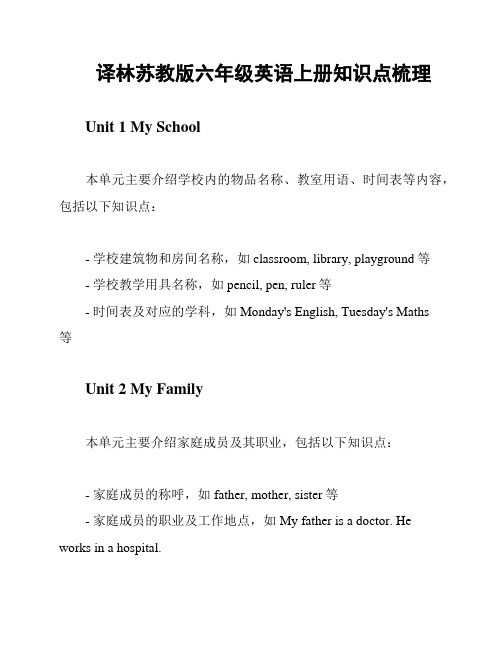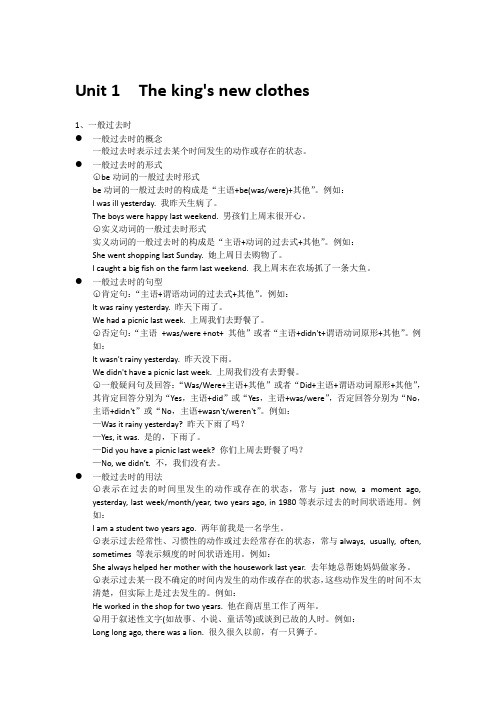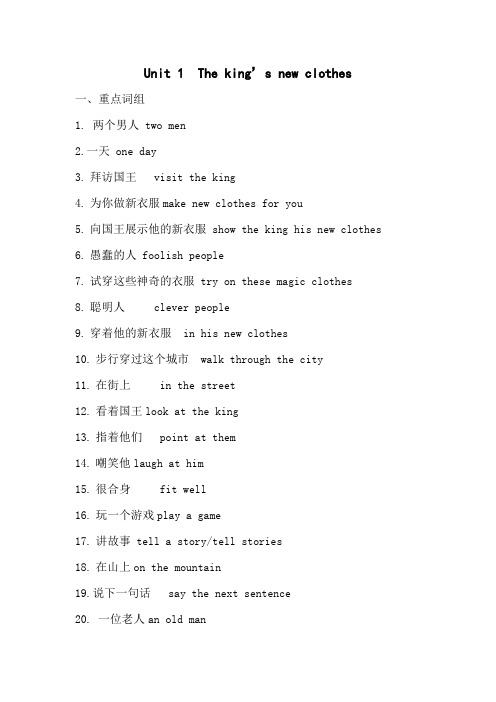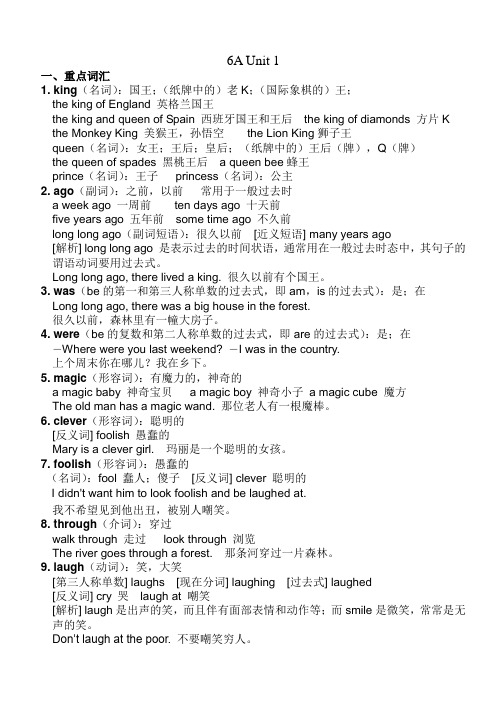译林英语六年级上册英语第一单元知识点梳理
译林苏教版六年级英语上册知识点梳理

译林苏教版六年级英语上册知识点梳理Unit 1 My School本单元主要介绍学校内的物品名称、教室用语、时间表等内容,包括以下知识点:- 学校建筑物和房间名称,如classroom, library, playground等- 学校教学用具名称,如pencil, pen, ruler等- 时间表及对应的学科,如Monday's English, Tuesday's Maths等Unit 2 My Family本单元主要介绍家庭成员及其职业,包括以下知识点:- 家庭成员的称呼,如father, mother, sister等- 家庭成员的职业及工作地点,如My father is a doctor. He works in a hospital.Unit 3 My Friends本单元主要介绍朋友的外貌特征、兴趣爱好、所在地等内容,包括以下知识点:- 描述人的外貌特征,如长相、身高等,如He is tall and has short hair.- 描述人的兴趣爱好及所在地,如My friend likes playing football. He is from Beijing.Unit 4 My Day本单元主要介绍一天中不同时间和活动,包括以下知识点:- 时间表及活动名称,如9 o'clock, have breakfast等- 询问时间的用语,如What time is it?等Unit 5 My Weekends本单元主要介绍周末活动,包括以下知识点:- 周末不同活动名称,如watch TV, go swimming等- 动词-ing形式及其用法,如playing、watching等Unit 6 My Holidays本单元主要介绍不同假期的活动及地点,包括以下知识点:- 不同假期及其名称,如Summer Holiday, Spring Festival等- 假期活动及地点,如I'll go camping in the mountains during the summer holidays.Unit 7 My Body本单元主要介绍人体不同部位和器官及其用途,包括以下知识点:- 人体不同部位的名称,如head, arm, leg等- 器官及其作用,如The heart pumps blood around my body.Unit 8 My Food本单元主要介绍不同食物和饮料,包括以下知识点:- 不同的食物和饮料名称,如hamburger, sandwich, milk等- 句型What would you like?及其回答,如I'd like a pizza, please. Unit 9 My Clothes本单元主要介绍不同衣服及其颜色,包括以下知识点:- 不同的衣服名称,如T-shirt, dress, shoes等- 颜色名称,如red, blue, yellow等Unit 10 My House本单元主要介绍房屋不同部位及其名称,包括以下知识点:- 房屋不同部位的名称,如living room, bedroom, kitchen等- 物品名称,如sofa, bed, fridge等。
译林英语六年级上册英语第一单元知识点梳理

译林英语六年级上册英语第一单元知识点梳理译林英语六年级上册英语第一单元知识点梳理一、单元概述本单元是译林英语六年级上册的第一单元,主题为“Open your book”,主要介绍了如何打开你的书。
通过本单元的学习,学生将掌握一些基本的英语词汇、语法和语言表达,为进一步学习英语打下坚实的基础。
二、知识点梳理1、词汇(1)常见文具用品词汇:book(书)、bag(书包)、pencil(铅笔)、rubber(橡皮)、 ruler(尺子)、pen(钢笔)、pencil case(铅笔盒)等。
(2)常见颜色词汇:red(红色)、blue(蓝色)、green(绿色)、yellow(黄色)、black(黑色)、white(白色)等。
2、语法(1)基本句型:本单元主要介绍了“There be”句型,例如:“There is a book on the table.”(桌子上有一本书。
)(2)动词时态:本单元学习了现在进行时,例如:“I am reading abook.”(我正在读书。
)3、阅读理解本单元的阅读材料为“Open Your Book”,是一篇关于如何打开书本的短文。
通过阅读,学生可以了解如何正确地打开书本,以及打开书本的重要性。
4、写作本单元的写作练习为“Write about your day”,要求学生用英语描述自己的一天。
通过写作,学生可以锻炼自己的英语表达能力,提高英语写作水平。
三、知识大纲1、掌握常见文具用品和颜色词汇。
2、掌握“There be”句型和现在进行时。
3、阅读理解“Open Your Book”,了解如何正确地打开书本。
4、写作练习“Write about your day”,锻炼英语表达能力和写作水平。
四、拓展延伸1、其他有关文具用品和颜色的词汇:更多的文具用品词汇如笔记本电脑(notebook)、文具盒(stationery box)等;更多的颜色词汇如橙色(orange)、粉色(pink)、紫色(purple)等。
新译林版六年级上册英语知识点归纳总结

Unit 1 The king's new clothes1、一般过去时●一般过去时的概念一般过去时表示过去某个时间发生的动作或存在的状态。
●一般过去时的形式○1be动词的一般过去时形式be动词的一般过去时的构成是“主语+be(was/were)+其他”。
例如:I was ill yesterday. 我昨天生病了。
The boys were happy last weekend. 男孩们上周末很开心。
○2实义动词的一般过去时形式实义动词的一般过去时的构成是“主语+动词的过去式+其他”。
例如:She went shopping last Sunday. 她上周日去购物了。
I caught a big fish on the farm last weekend. 我上周末在农场抓了一条大鱼。
●一般过去时的句型○1肯定句:“主语+谓语动词的过去式+其他”。
例如:It was rainy yesterday. 昨天下雨了。
We had a picnic last week. 上周我们去野餐了。
○2否定句:“主语+was/were +not+ 其他”或者“主语+didn't+谓语动词原形+其他”。
例如:It wasn't rainy yesterday. 昨天没下雨。
We didn't have a picnic last week. 上周我们没有去野餐。
○3一般疑问句及回答:“Was/Were+主语+其他”或者“Did+主语+谓语动词原形+其他”,其肯定回答分别为“Yes,主语+did”或“Yes,主语+was/were”,否定回答分别为“No,主语+didn't”或“No,主语+wasn't/weren't”。
例如:—Was it rainy yesterday? 昨天下雨了吗?—Yes, it was. 是的,下雨了。
—Did you have a picnic last week? 你们上周去野餐了吗?—No, we didn't. 不,我们没有去。
译林版六年级英语上册各单元知识点归类整理(第一学期期末复习资料重点归纳)

Unit 1 The king’s new clothes一、重点词组1. 两个男人 two men2.一天 one day3.拜访国王 visit the king4.为你做新衣服make new clothes for you5.向国王展示他的新衣服 show the king his new clothes6.愚蠢的人 foolish people7.试穿这些神奇的衣服 try on these magic clothes8.聪明人 clever people9.穿着他的新衣服 in his new clothes10.步行穿过这个城市 walk through the city11.在街上 in the street12.看着国王look at the king13.指着他们 point at them14.嘲笑他laugh at him15.很合身 fit well16.玩一个游戏play a game17.讲故事 tell a story/tell stories18.在山上on the mountain19.说下一句话 say the next sentence20. 一位老人an old man21.住在这个房子里 live in the house22. 给这个小男孩讲一个故事tell the little boy a story23.认真思考 think hard24. 又得重新开始这个故事了have to start the story again25.从她那得到一张卡片 get a card from her26.在四点半 at half past four27.一个美国牛仔 an American cowboy28.穿着牛仔裤 wear jeans29.一个苏格兰男士 a Scottish man30.穿一条苏格兰短裙 wear a kilt31.住在两座山后 live behind two mountains32. 对他的家人说 say to his family33.努力工作 work hard34.累却快乐着 be tired but happy35. 在森林里 in the forest36.一些动物 some animals二、重点句子1.多么漂亮的衣服啊! What beautiful clothes!2.国王没有穿任何衣服。
【新】译林版六年级上册英语 第1-8单元全册重点知识点归纳总结

六上Unit1单元知识一、词组1皇帝的新衣the king’s new clothes2很久以前long long ago3某一天one day4两个男子two men5拜访国王visit the king6为你做新衣服make new clothes for you7给国王看他的新衣show the king his new clothes8试穿try on9这些魔法衣服these magic clothes10聪明的人clever people11愚蠢的人foolish people12穿着他的新衣in his new clotheswear his new clothes13许多人a lot of people14在街上in the street15看着国王look at the king16一个小男孩a little boy17指着国王point at the king18嘲笑他laugh at him19非常合身fit well20穿着黄色毛衣wear yellow sweater21在四点半at half past four22穿着牛仔裤wear jeans23讲故事tell a story24每个学生each student25下一句the next sentence26轮到波比了。
It is Bobby’s turn.27努力地想think hard28下一句是什么?What’s next?29不得不重新开始讲故事have to start the story again30在狮子的房子前面in front of the lion’s house31在房子旁边散步walk by the house32对着老人大喊shout at the old man33把你的孩子给我give me your childgive your child to me34和狮子住在一起live with the lion35对她很好be nice to her36照顾他look after him37快点be quick38穿过城市walk through the city39在山上on the mountain40住在森林里live in the forest41愤怒的狮子the angry lion42生病了be sick/be ill43变成一个王子turn into a prince△44一个苏格兰男士a Scottish man△45穿一条苏格兰裙wear a kilt△46一个美国牛仔an American cowboy47What beautiful clothes!多漂亮的衣服!48make the clothes for me为我做衣服49come to my party来参加我的聚会50pick a flower摘一朵花51the old man’s child老人的孩子52say one sentence说一个句子二、句型1.Long long ago,there was a king.很久以前,有以为国王。
新译林版六年级上册英语知识点归纳总结

Unit 1 The king's new clothes1、一般过去时●一般过去时的概念一般过去时表示过去某个时间发生的动作或存在的状态。
●一般过去时的形式○1be动词的一般过去时形式be动词的一般过去时的构成是“主语+be(was/were)+其他”。
例如:I was ill yesterday. 我昨天生病了。
The boys were happy last weekend. 男孩们上周末很开心。
○2实义动词的一般过去时形式实义动词的一般过去时的构成是“主语+动词的过去式+其他”。
例如:She went shopping last Sunday. 她上周日去购物了。
I caught a big fish on the farm last weekend. 我上周末在农场抓了一条大鱼。
●一般过去时的句型○1肯定句:“主语+谓语动词的过去式+其他”。
例如:It was rainy yesterday. 昨天下雨了。
We had a picnic last week. 上周我们去野餐了。
○2否定句:“主语+was/were +not+ 其他”或者“主语+didn't+谓语动词原形+其他”。
例如:It wasn't rainy yesterday. 昨天没下雨。
We didn't have a picnic last week. 上周我们没有去野餐。
○3一般疑问句及回答:“Was/Were+主语+其他”或者“Did+主语+谓语动词原形+其他”,其肯定回答分别为“Yes,主语+did”或“Yes,主语+was/were”,否定回答分别为“No,主语+didn't”或“No,主语+wasn't/weren't”。
例如:—Was it rainy yesterday? 昨天下雨了吗?—Yes, it was. 是的,下雨了。
—Did you have a picnic last week? 你们上周去野餐了吗?—No, we didn't. 不,我们没有去。
译林英语6年级上册第一单元知识点

New words:1.Long long ago 很久之前,常用于一般过去式Long long ago, there was a king.2. magic形容词,意为“有魔力的,神奇的”It’s a magic bag.3. clever形容词,意为“聪明的”反义词:foolish 愚蠢的我弟弟是一个聪明的男孩。
__________________________________3. foolish形容词,意为“愚蠢的”你的主意是愚蠢的。
__________________________________4. through介词,意为“穿过” go/walk through the window/the door5. Laugh动词,意为“笑,大笑”;现在分词:laughing 过去式:laughed 反义词:cry 哭短语:laugh at 嘲笑……不要嘲笑他! __________________________________6.Tell 讲述、叙述Tell a story He is telling a story to his sister.7 wear 动词,意为“穿;戴”现在分词:wearing 过去式:wore近义短语:put on 穿上强调动作。
Wear 强调状态She put on her red dress after getting up.她正穿着一件红色的T恤衫。
__________________________________8. Little 小的、年幼的small用来指外形、尺寸较小,它的反义词是big和large。
Small houselittle含有更多情感,表示"小巧的""小而可爱的"。
如:Little boy, little dog9. Turn 可数名词轮到的机会It is one’s turn to do somethingToday, it's my turn to clean the classroom.10. Think 想、思考Think it hard I think so. I don’t think so. MM11. Child 孩子可数名词,复数形式Children 儿童节Children’s DayHow many children are there in your class? When I was a child, I lived in a small village. Turn into 变成turn lakes into fields 围湖造田Turn that room into a reading room【重难点讲解】1.Long long ago, there was a king.There be 结构There is a book on the desk.There are four students in the classroom.表示过去某处有某人或某物的句型:There was/were…课文应用:Long long ago, there was a king.句型结构:There was/were + 某人/某物(+ 地点).was/were实际上是is/are的过去式,它们的选用要根据离它们最近的名词的数来决定,遵循“就近原则”。
小学英语六年级 上册 (牛津译林版)Unit1 king's new clothes 知识点复习资料

6A Unit 1一、重点词汇1. king(名词):国王;(纸牌中的)老K;(国际象棋的)王;the king of England 英格兰国王the king and queen of Spain 西班牙国王和王后the king of diamonds 方片K the Monkey King 美猴王,孙悟空the Lion King狮子王queen(名词):女王;王后;皇后;(纸牌中的)王后(牌),Q(牌)the queen of spades 黑桃王后 a queen bee蜂王prince(名词):王子princess(名词):公主2. ago(副词):之前,以前常用于一般过去时a week ago 一周前ten days ago 十天前five years ago 五年前some time ago 不久前long long ago(副词短语):很久以前[近义短语] many years ago[解析] long long ago 是表示过去的时间状语,通常用在一般过去时态中,其句子的谓语动词要用过去式。
Long long ago, there lived a king. 很久以前有个国王。
3. was(be的第一和第三人称单数的过去式,即am,is的过去式):是;在Long long ago, there was a big house in the forest.很久以前,森林里有一幢大房子。
4. were(be的复数和第二人称单数的过去式,即are的过去式):是;在-Where were you last weekend? -I was in the country.上个周末你在哪儿?我在乡下。
5. magic(形容词):有魔力的,神奇的a magic baby 神奇宝贝 a magic boy 神奇小子a magic cube 魔方The old man has a magic wand. 那位老人有一根魔棒。
- 1、下载文档前请自行甄别文档内容的完整性,平台不提供额外的编辑、内容补充、找答案等附加服务。
- 2、"仅部分预览"的文档,不可在线预览部分如存在完整性等问题,可反馈申请退款(可完整预览的文档不适用该条件!)。
- 3、如文档侵犯您的权益,请联系客服反馈,我们会尽快为您处理(人工客服工作时间:9:00-18:30)。
Unit1 短语、词汇、知识点梳理
一、第一单元短语
1.皇帝的新衣the king’s new clothes
2.很久很久以前long long ago
3.有一个国王there was a king
4.某一天one day
5.两个男子/女子two men/women
6.拜访国王visit the king
7.为你做新衣服make new clothes for you
8.给国王看他的新衣show the king his new clothes
9.试穿try on
10.这些魔法衣these magic clothes
11.聪明的人clever people
12.愚蠢的人foolish people
13.看见他们see them
14.穿过城市walk through the city
15.穿着他的新衣in his new clothes/ wear his new clothes
16.有许多人there were a lot of people
17.在街上in the street
18.看着国王look at the king
19.多么漂亮的衣服啊!What beautiful clothes! =How beautiful the clothes are!
20.一个小男孩 a little boy
21.指着国王point at/to the king
22.嘲笑他laugh at him
23.非常合身fit well
24.今天下午this afternoon
25.一张来自我好友Mark的卡片 a card from my good friend Mark
26.来参加我的聚会come to my party
27.在四点半at half past four
28.在公园里in the park
29.一个美国牛仔an American cowboy
30.穿着牛仔裤wear jeans
31.一个苏格兰男士
-
32.穿一条苏格兰裙wear a kilt
33.狐狸老师和她的学生们Miss Fox and her students
34.讲故事tell a story
35.每个学生说一个句子。
Each student says one sentence.
36.在山上on the mountain
37.下一句the next sentence
38.给男孩讲了一个故事tell the boy a story
39.轮到Bobby了。
It is Bobby’s turn.
40.努力地想think hard
41.下一句是什么?What’s next?
42.不得不重新开始讲故事have to start the story again
43.住在森林里live in the forest
44.在狮子的房子前面in front of the lion’s house
45.在房子旁边散步walk by the house
46.愤怒的狮子the angry lion
47.对着老人大喊shout at the old man
48.把你的孩子给我give me your child=give your child to me
49.一个美丽的女孩 a beautiful girl
50.和狮子住在一起live with the lion
51.对她很好be nice to her
52.生病了be sick/be ill
53.照顾他look after him
54.变成一个王子turn into a prince
55.背诵课文recite the text
二、第一单元词汇
1.很久以前long long ago /once upon a time
2.有魔力的magic
3.聪明的clever
4.愚蠢的foolish
5.穿过through
-
6.笑,大笑laugh
7.穿wear
8.讲,叙述tell
9.每个each
10.说say
11.句子sentence
12.迅速的,快的quick
13.下一个next
14.小的little
15.机会turn
16.想,思考think
17.努力地,费劲地hard
18.孩子child (复数children )
19.变成turn into
三、第一单元知识点梳理
1、there be结构在一般过去时的各种句型转换:
There be结构的组成:There be + 名词短语+方位短语.
(数量词+名词)
(1)肯定句:
e.g.: Long long ago, there was a king. / There were a lot of people in the street.
(2)否定句:在be动词was或were后+not, some要改成any.
e.g.: There were some people in the street.(否定句)
There were not any people in the street.
(3) 一般疑问句及其肯定和否定回答:
e.g.: A: Was there a house on the mountain?
B: Yes, there was. / No, there wasn’t.
(4)有关there be的特殊疑问句的问答:
A1:What was in front of the lion’s house?(针对名词短语提问)
B1: There were some flowers .
A2: How many houses were there on the mountain?(针对数量词提问)
B2: There was one.
2、动词在一般过去时中的变化:
a、be动词在一般过去时中的变化:was/were.其中Checkout time中的circle and say进行了重点操练。
b、规则动词的一般过去时的四种变化:(1)直接+ed; (2)以不发音的e结尾+d;(3)辅音+y结尾的,变y为i,+ed;(4)末尾是辅音字母加一个元音字母和一个辅音字母的重读闭音节,应双写末尾的辅音字母,再加-ed。
(其中后两种变化,教材中并没有出现。
)
3、有关动词过去式的变化:
不规则动词有:
4、规则动词过去式+ed的发音规律:清碰清读作/t/,浊碰浊读作/d/,元音之后要读/d/,/t//d/之后读/i d/。
5、字母组合ar的发音:/a:/。
6、有关Unit1相关故事的延展:Story time 改写自《安徒生童话》中的The Emperor's New Clothes(皇帝的新衣),指导学生尝试阅读英语故事;Checkout time 中则选用了《格林童话》中的The singing, springing lark。
故事性都比较强,通过两个故事的对比发现人物的不同性格:国王的贪慕虚荣,女孩的诚实守信。
7、有关习作的指导:本文是一篇很好的利用there be结构对学生进行习作指导的范例,Cartoon time就是一个很好的范本,前4幅图老师和学生们用33个单词、4句话讲述了一个小故事,教学中可以通过听、读、演、说、讲这些环节的实施,最终达到学生顺利写作的目的。
8、重视Grammar time中蓝白色块的对比:引导学生通过对比发现、了解简单句的基本构成:主语+谓语+宾语(+方位短语),为本单元的写作打好基础。
9、Culture time的讲解要从中外服饰的对比中,增强学生的祖国意识。
如:汉服:Hanfu, 唐装:Tang suit。
10、介词的用法:
make new clothes for you try on
walk through the city in his new clothes
in the street look / point / laugh / shout at
a card from my good friend Mark at half past four
in the park on the mountain
in the forest in front of the lion’s house
walk by the house live with the lion
be nice to her look after him
turn into a prince。
